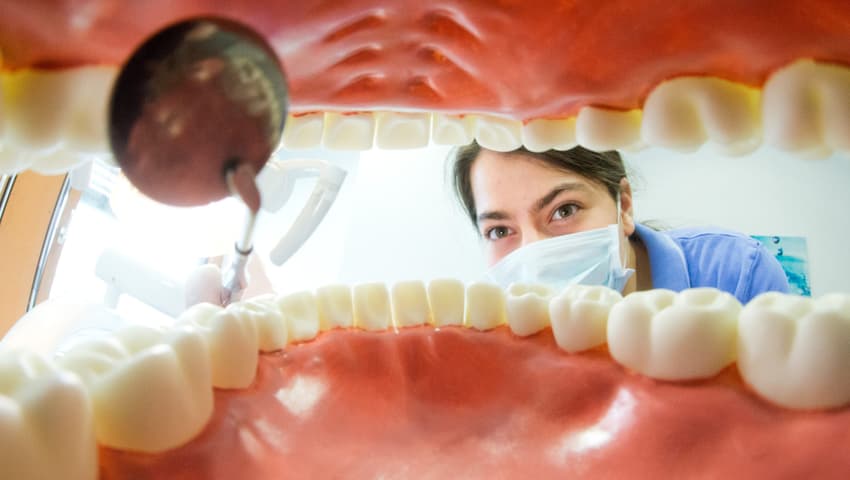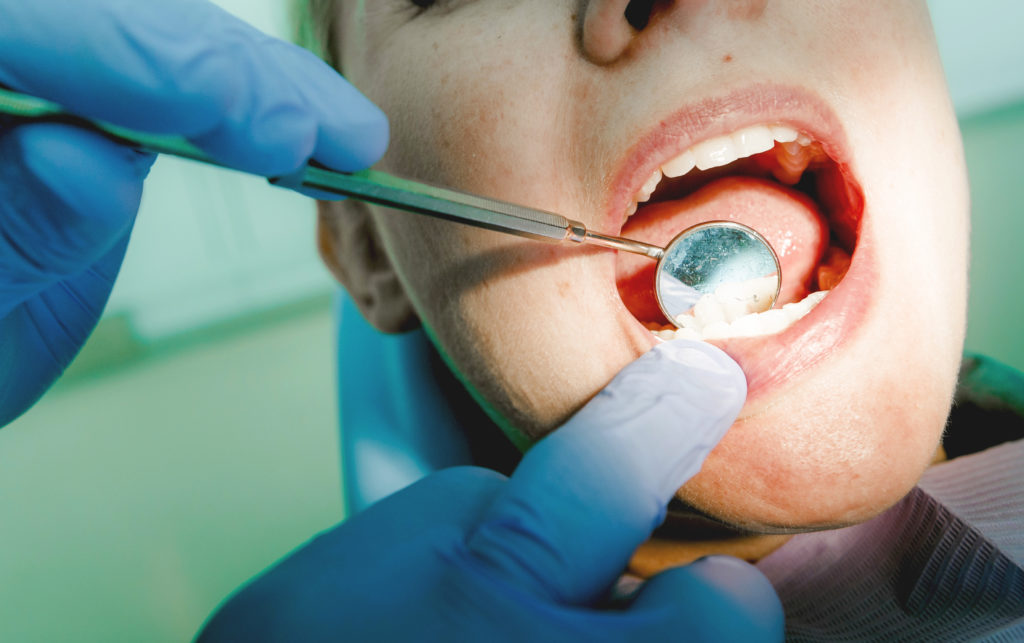The vocab you need for a trip to the dentist in Germany

Going to the dentist can be daunting at the best of times and being unsure of the language can make things ten times worse. We’ve put together a guide of the German words and phrases you need to help take some of the pain away.
When you arrive at the dentist, you'll usually be asked if you're gesetzlich or privat versichert (if you have state or private health insurance) and asked to present your health insurance card. However, for most procedures, you will still have to pay something extra on top.
The most common reason for a trip to the dentist (Zahnarzt) is having eine Vorsorgeuntersuchung (check-up) or a cleaning appointment (eine Zahnreinigung or eine Prophylaxe) which most dentists recommend having twice a year.
Most health insurers won't reimburse the full cost of teeth cleaning - so make sure you check beforehand with your Krankenkasse which costs are covered.
In a cleaning appointment, the dentist will remove plaque (der Zahnbelag) and check the health of your teeth (die Zähne) and gums (das Zahnfleisch). If they tell you that they see Karies (tooth decay) then you may be told to come back for another appointment to get a filling (eine Zahnfüllung or eine Plombe).
READ ALSO: Everything you need to know about making a doctor’s appointment in Germany
They will certainly remind you at the end of the appointment to use Zahnseide (dental floss) on a daily basis (täglich) and also recommend that you use Interdentalbürsten (interdental brushes) for cleaning in between the teeth.
In the chair
When you actually get into the hot seat, you will be usually asked to do certain things by your dentist or dental assistant (Zahntechniker) so they can do what they need to do.
The first thing you’ll usually be asked to do is ausspülen bitte – to rinse your mouth with mouthwash (die Mundspülung) usually in a plastic cup in a little sink next to the dental chair. They might ask you to keep the liquid in your mouth for a certain number of seconds until they tell you to ausspucken (spit it out).

A woman undergoes a dental examination. Photo: picture alliance/dpa/dpa-tmn | Markus Scholz
When you’re lying down, you’ll inevitably be told Mund öffnen bitte or aufmachen bitte (open your mouth) and likewise, you might be asked to zumachen (close) your mouth at some point. Other typical instructions in the dentist’s chair are: Mundlocker lassen (relax your mouth), Kopf zu mir drehen (turn your head towards me) and Kinn nach oben (chin upwards).
Types of dental issues
There are numerous complaints that could compel you to pay a visit to the dentist, but one of the most common is having a filling (eine Zahnfüllung) or having a crown (eine Zahnkrone).Your health insurance will cover the cost of the most basic kind of material for filling up a cavity, but you will be presented with a price list (or if you aren’t – ask) for the different types of materials for crowns or fillings.
READ ALSO: EXPLAINED: How dental care works in Germany
Another common complaint is having to have a tooth removed (eine Zahnextraction) – a particularly common procedure for a wisdom tooth (der Weisheitszahn). A more serious extraction procedure is a root canal treatment (eine Wuzelkanalbehandlung).
If you have this kind of procedure, you will normally be offered a local anaesthetic (örtliche Betäubung or Lokalanästhesie) and you may also need an X-Ray (ein Röntgen).
More useful phrases and vocabulary
Braces – (die) Zahnspangen
Sensitive teeth – empfindliche
ZähneTooth pain – (der) Zahnschmerz
Dentures – (die) ProtheseI have toothache when I chew/drink - Ich habe Zahnschmerzen beim kauen/trinken
I have light/strong pain on this tooth - Ich habe leichte/starke Schmerzen an diesem Zahn
My gums are inflamed - Ich habe eine Entzündung am Zahnfleisch
I am nervous about the treatment - Ich habe Angst vor der Behandlung
Comments
See Also
When you arrive at the dentist, you'll usually be asked if you're gesetzlich or privat versichert (if you have state or private health insurance) and asked to present your health insurance card. However, for most procedures, you will still have to pay something extra on top.
The most common reason for a trip to the dentist (Zahnarzt) is having eine Vorsorgeuntersuchung (check-up) or a cleaning appointment (eine Zahnreinigung or eine Prophylaxe) which most dentists recommend having twice a year.
Most health insurers won't reimburse the full cost of teeth cleaning - so make sure you check beforehand with your Krankenkasse which costs are covered.
In a cleaning appointment, the dentist will remove plaque (der Zahnbelag) and check the health of your teeth (die Zähne) and gums (das Zahnfleisch). If they tell you that they see Karies (tooth decay) then you may be told to come back for another appointment to get a filling (eine Zahnfüllung or eine Plombe).
READ ALSO: Everything you need to know about making a doctor’s appointment in Germany
They will certainly remind you at the end of the appointment to use Zahnseide (dental floss) on a daily basis (täglich) and also recommend that you use Interdentalbürsten (interdental brushes) for cleaning in between the teeth.
In the chair
When you actually get into the hot seat, you will be usually asked to do certain things by your dentist or dental assistant (Zahntechniker) so they can do what they need to do.
The first thing you’ll usually be asked to do is ausspülen bitte – to rinse your mouth with mouthwash (die Mundspülung) usually in a plastic cup in a little sink next to the dental chair. They might ask you to keep the liquid in your mouth for a certain number of seconds until they tell you to ausspucken (spit it out).

A woman undergoes a dental examination. Photo: picture alliance/dpa/dpa-tmn | Markus Scholz
When you’re lying down, you’ll inevitably be told Mund öffnen bitte or aufmachen bitte (open your mouth) and likewise, you might be asked to zumachen (close) your mouth at some point. Other typical instructions in the dentist’s chair are: Mundlocker lassen (relax your mouth), Kopf zu mir drehen (turn your head towards me) and Kinn nach oben (chin upwards).
Types of dental issues
There are numerous complaints that could compel you to pay a visit to the dentist, but one of the most common is having a filling (eine Zahnfüllung) or having a crown (eine Zahnkrone).Your health insurance will cover the cost of the most basic kind of material for filling up a cavity, but you will be presented with a price list (or if you aren’t – ask) for the different types of materials for crowns or fillings.
READ ALSO: EXPLAINED: How dental care works in Germany
Another common complaint is having to have a tooth removed (eine Zahnextraction) – a particularly common procedure for a wisdom tooth (der Weisheitszahn). A more serious extraction procedure is a root canal treatment (eine Wuzelkanalbehandlung).
If you have this kind of procedure, you will normally be offered a local anaesthetic (örtliche Betäubung or Lokalanästhesie) and you may also need an X-Ray (ein Röntgen).
More useful phrases and vocabulary
Braces – (die) Zahnspangen
Sensitive teeth – empfindliche
ZähneTooth pain – (der) Zahnschmerz
Dentures – (die) ProtheseI have toothache when I chew/drink - Ich habe Zahnschmerzen beim kauen/trinken
I have light/strong pain on this tooth - Ich habe leichte/starke Schmerzen an diesem Zahn
My gums are inflamed - Ich habe eine Entzündung am Zahnfleisch
I am nervous about the treatment - Ich habe Angst vor der Behandlung
Join the conversation in our comments section below. Share your own views and experience and if you have a question or suggestion for our journalists then email us at [email protected].
Please keep comments civil, constructive and on topic – and make sure to read our terms of use before getting involved.
Please log in here to leave a comment.